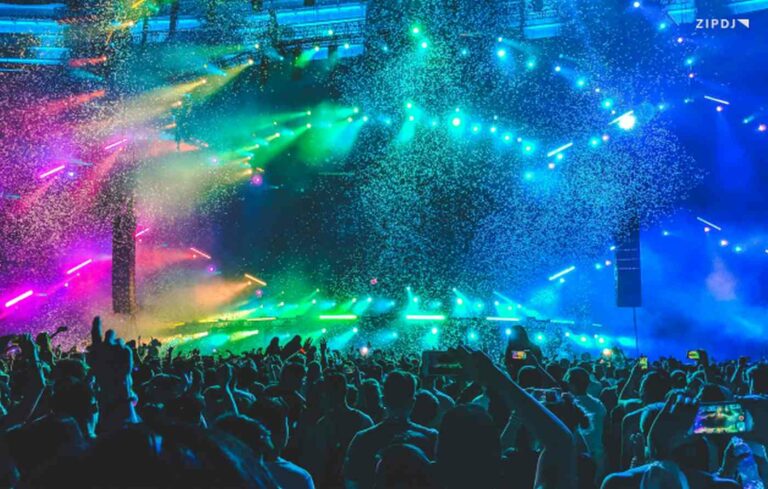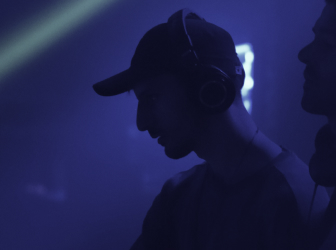How To Become A Corporate Event DJ In 2025 (Step-By-Step)

DJs ready to take their hobby to the next level can learn how to become a corporate event DJ and perform at exclusive gigs.
Working in collaboration with event organizers and venues, their goal is to make sure the guests enjoy corporate events by providing entertainment.
In this guide, we’ve broken down the business goals needed to become a professional DJ, from event planning to interacting with guests.

How To Become A Corporate Event DJ In 2025 (Step-By-Step)
From understanding what music your clients require to investing in the proper equipment, becoming a corporate events DJ can be overwhelming.
To help you deliver professional entertainment for corporate guests, this guide will cover the key steps that guarantee success.
So, let’s get your DJ career rolling and dive into everything you need to know to become a corporate event DJ in 2025:
Step 1: Improve Your Music Knowledge
If you’re ready to get your DJ career rolling, there are many options to choose from, and becoming a corporate event DJ has great earning potential.
However, unlike other types of DJs, a corporate event DJ is expected to have a much broader knowledge of music genres and styles.
Playing the right music is crucial and requires an approach that demonstrates a grasp of what works on the dance floor for an eclectic audience.
As such, you’ll be expected to curate a playlist of the latest chart songs along with classic party music to perform at a corporate event.
This means setting aside your personal preferences for music genres and artists and instead focusing on popular and enduring music.
There are many excellent websites you can follow to keep your playlists up to date, along with keeping a close eye on new chart releases.
You can also stay current with the latest technology trends, such as Spotify’s AI development, to stay informed about new releases.
Step 2: Buy DJ Equipment
While DJs who primarily work in clubs and bars have their equipment provided for them in the venue, event DJs often supply their own gear.
This means investing in a reliable DJ controller with the core features needed to mix, as well as headphones, microphones, and other accessories.
You don’t have to spend a fortune, and some of the best DJ controllers deliver comprehensive features on a reasonable budget.
It can also involve providing lighting rigs and other bespoke equipment, such as smoke machines, depending on the client’s requirements.
If you don’t have the funds to purchase disco lighting, reach out to suppliers in your local area to see if you can get a deal for hiring equipment.
Likewise, you’ll often be expected to provide the speakers for the corporate event, which can be costly if working in a large venue.
If the venue isn’t set up for professional DJs, you can hire speakers until you’ve earned enough to invest in these for future gigs.
Make sure you include any costs for hiring equipment in your pricing so these additional extras aren’t cutting into your profits.
Step 3: Build A Music Library
Once your musical knowledge has been expanded across multiple genres, it’s time to build a library that reflects your eclectic taste.
This means compiling a comprehensive music library covering the various genres and artists your corporate clients will expect from you.
There are lots of resources available to acquire this collection, from purchasing downloadable files online to physical media like CDs and records.
You can also use a DJ record pool to access the latest new releases as well as exclusive remixes and edits other DJs won’t have.
Building up your music collection should be carried out with an eye on organization, so you can find any track the event’s guests request.
As such, you should understand how to organize your DJ playlists to ensure you know where everything is when asked.
You can then use this organization as part of your corporate event DJ planning process, ensuring the guests enjoy your set before you arrive.
Step 4: Master DJing Techniques
There are many techniques professional event DJs need to master to deliver the highest possible standard of performance as a corporate DJ.
As such, you’ll need to demonstrate your ability behind the decks to stand out from the competition and make your DJ services appealing.
This means mastering mixing techniques that allow you to play music from a broad selection of genres at a moment’s notice.
Basic techniques such as beatmatching and key mixing provide the baseline of skills to create a party atmosphere for the crowd.
While more advanced DJing techniques, such as scratching, aren’t essential, a grasp of these will still give you an edge over competitors.
Learning how to MC is also important for offering guest entertainment and keeping the crowd engaged during your corporate event DJ gig.
If you’re new to MCing, spend some time practicing at home, recording your performance until you’re happy with your verbal delivery.
Step 5: Set Up A DJ Website
Whether you’re working as a professional DJ offering services for weddings or at corporate events, you’ll need a strong online presence.
This means setting up a website that you can use to share your previous gigs and any relevant information on pricing and services.
Your website should be visually stimulating, with high-quality photographs showing you behind the decks at prior events.
Spend some time researching the best DJ websites to see what layout and information other DJs use to highlight their unique services.
You don’t need extensive experience in web development to create a stunning website, with plenty of impressive templates to work with.
Any videos you have from past work can also be embedded in your website to give potential clients a clear reference of what to expect.
Make sure all contact information is included, and you can also add a form to take bookings directly through your DJ website.

Step 6: Determine Your Rates & Services
When you start offering your professional DJ services for corporate events, you’ll need to be clear on your rates and services.
This means understanding the average DJ costs worldwide so you can establish competitive rates that match your skill and equipment.
Your level of experience will inform your basic rates, and as you pick up more gigs over time, you can continue to increase your fees.
If you’re providing equipment to use for your events, this can also be used to determine higher rates to cover these additional costs.
Any other extra entertainment you’re offering the event’s guests can also be factored into your rates and included in your pricing.
Some corporate event DJs include musicians and singers in their packages as optional extras that corporate clients can choose from.
If this is the case, you may want to create a tiered pricing option that begins with a basic package before moving up to full services.
Step 7: Reach Out To Event Planners
Becoming a professional DJ requires strong communication skills so you can liaise with an event planner before the big event.
Just as marketing wedding DJ services is essential for success, so too must corporate DJs include marketing in their list of business goals.
Your DJ website is the first port of call for potential clients, so keeping this up to date to cover your previous gigs is crucial.
It can also be used in conjunction with a press kit notifying event planners and venues about your corporate event DJing services.
If you’re new to working as a corporate event DJ, start by compiling a list of event-planning businesses in your local area.
Reach out to these and other relevant venues and make inquiries to see if they’re looking for new DJs to work with on events.
Keep track of the ones you’ve made contact with, refining your list over time until you’ve narrowed it down to those who have expressed interest.
As your reputation develops and your archive of past gigs increases, you can approach more event organizers in the future.
Step 8: Dress Professionally
Once you’ve successfully booked a corporate DJing gig, you’ll need to present yourself professionally during the event.
While DJing in clubs offers plenty of leeway in terms of how you’re dressed, a corporate event will expect a much higher standard of attire.
It’s unlikely you’ll be expected to dress as formally as a professional DJ playing on a wedding day in a three-piece suit and bow tie.
With that said, a smart shirt and trousers are a must for any corporate event DJ’s wardrobe to present yourself professionally.
If in doubt, speak to the event planner before the corporate event and check to see what dress code they expect from their DJ service.
In the event you’re expected to dress to the nines, you can always hire smart clothes for your corporate gig and include this in expenses.
On the other hand, the option to dress casually shouldn’t be an excuse to not present yourself well and show off your knack for style.
Step 9: Network At DJ Gigs
While reaching out to professional event organizers and corporate venues is important, networking at gigs shouldn’t be overlooked.
Large companies such as Meta have been known to hire DJs for events where some of their top leaders and influencers are present.
As such, professional DJs at such events rub shoulders with influential people who may want your services for upcoming events.
Impressing these guests is a surefire way to put you on their radar and become one of their top choices the next time they host a party.
This means making sure you have a business card at hand, so when the opportunity arises you’re able to quickly share your business details.
Avoid being pushy with guests at an event, as this may work against you by putting them off considering you in the future.
Should any guests express an interest in hiring you for an event, note down their contact details and follow it up over the following days.
Since guests at such events are likely to be drinking alcohol, bear in mind their enthusiasm may not reflect their actual intentions the next day.
If that’s the case, don’t be disheartened if they don’t follow up on your email, but put it down to experience and improve your filter.
Step 10: Build Your Reputation
When a potential client is looking for a professional DJ to hire for an event, the first thing they will do is check on your reputation.
The ability to work in a variety of environments, the size of the audience, and their style in music are a few of the core considerations at play.
This makes establishing and building a reputation one of the cornerstones professional DJs work on continually throughout their careers.
Gathering great feedback and glowing reviews, then sharing these across social media pages, is a great way to start building your reputation.
With each professional DJ gig you perform, you can work on mastering DJ performance tips that showcase your unique skills.
Once you’ve put on successful events, you can gather testimonials from your clients and use these to pick up more work.
These testimonials should be easily accessible through your DJ website, offering clear proof that you understand how to entertain guests.
Professionally presenting yourself at meetings with potential clients will also help cement a strong and reputable impression.
Summary
Professional DJs can make considerable sums of money by offering their DJing and entertainment services to corporate events.
We hope this guide has provided a solid foundation for your career in the corporate sphere and for you to attract high-profile clients.
As you continue to gain experience and develop your business, your chances of acquiring bigger and better corporate gigs will increase.
Start building a comprehensive music library with a ZIPDJ subscription and launch a successful corporate event DJ career.
Not a member ?
Join Today for Unlimited Music Downloads. Visit zipdj.com for more information.



